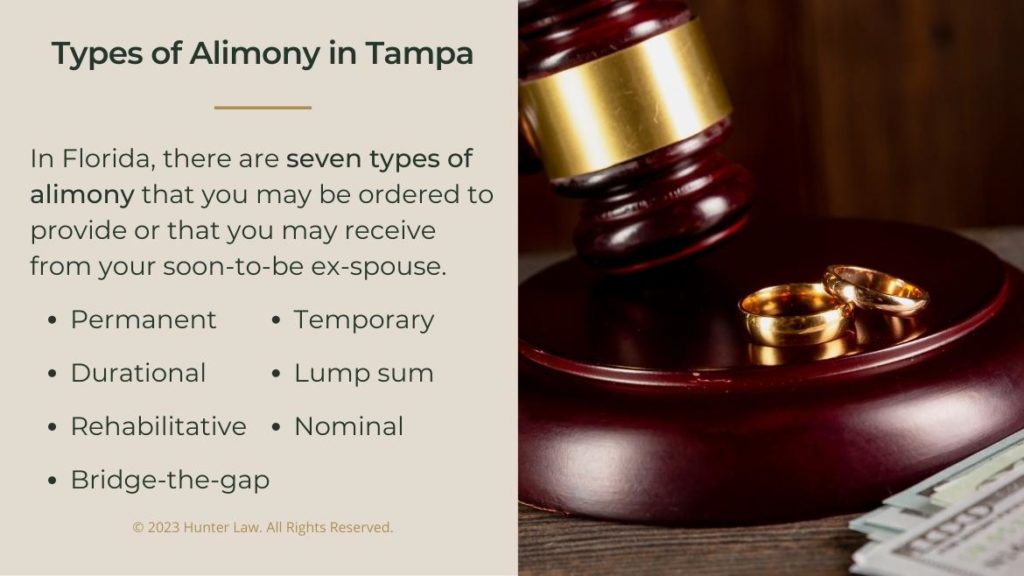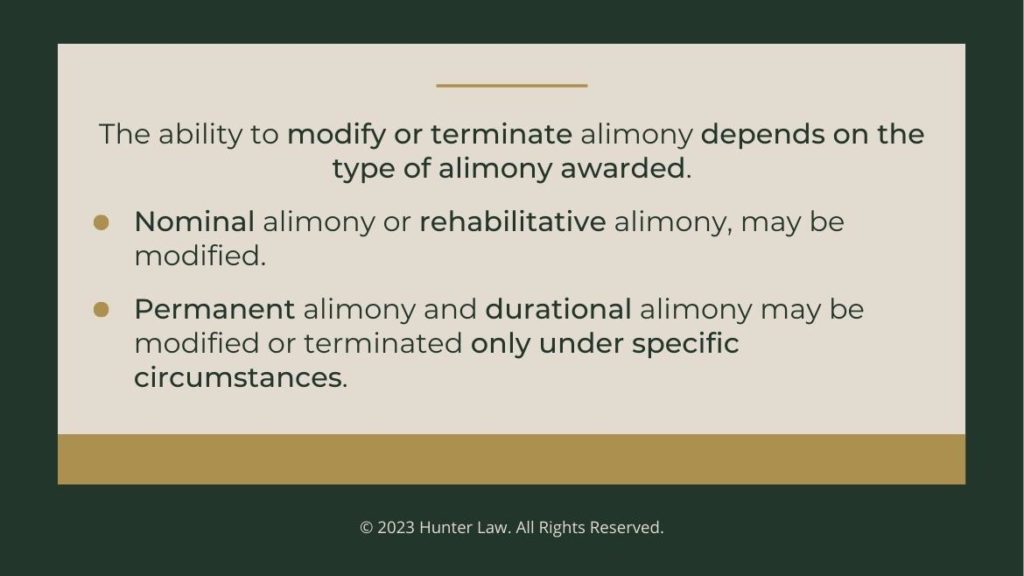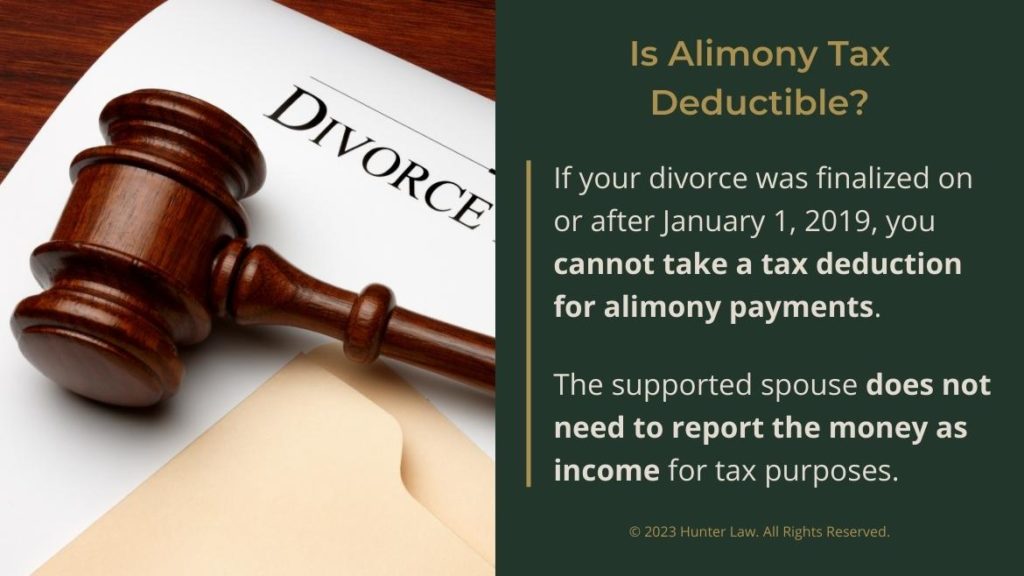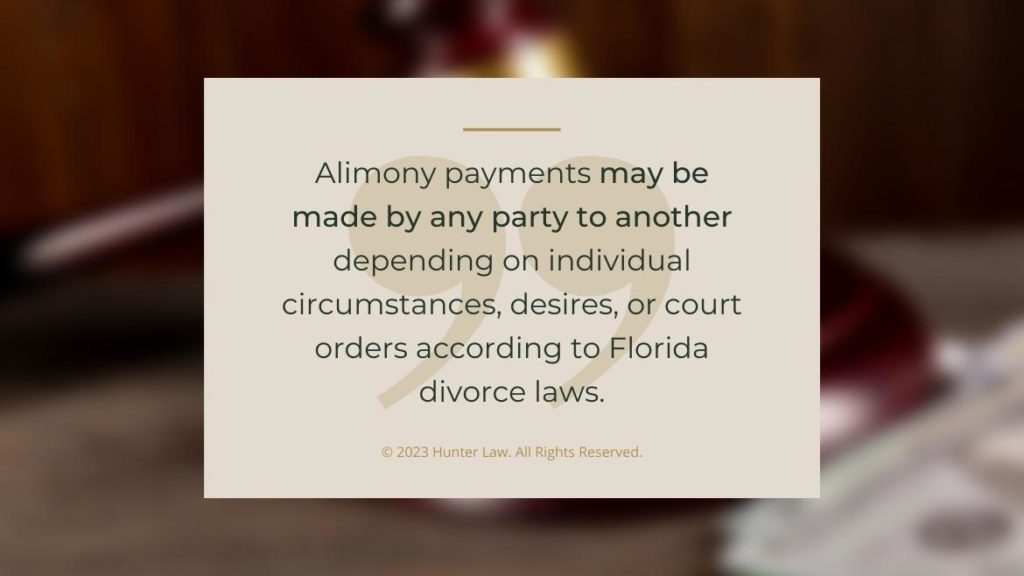Divorce is a difficult and costly time for everyone involved. But before you start the divorce process, you need to understand alimony, how it can impact your finances, and whether you qualify for alimony payments from your spouse. Read on for more information about alimony in Florida.
Alimony in Florida Explained
Alimony is a payment made by one spouse to another during and after they are legally divorced. Alimony may be court-ordered, or it may be agreed upon by both spouses when they divorce or as a divorce case proceeds.
Although most alimony payments are from male individuals in divorced couples to female individuals, this is not always the case. Alimony payments may be made by any party to another depending on individual circumstances, desires, or court orders according to Florida divorce laws.
Types of Alimony in Tampa
In Florida, there are five types of alimony that you may be ordered to provide or that you may receive from your soon-to-be ex-spouse. As provided for in the Florida Statutes, these are permanent alimony, durational alimony, rehabilitative alimony, bridge-the-gap alimony, and temporary alimony.
- *Permanent alimony is ongoing financial support until the payee spouse is remarried or until one party dies. Permanent alimony may be modified after the fact under certain circumstances. *This type of alimony was eliminated in the state of Florida effective July 1, 2023.
- Durational alimony provides a payee spouse with financial assistance for a certain amount of time after marriage, but may not be awarded for a period of time longer than the marriage. Durational alimony may be awarded in short-term or moderate-term marriages, or long-term marriages when there is no ongoing need for permanent support. It terminates when the indicated duration of time passes, or when a payee spouse remarries, or if either ex-spouse dies. It may be modified, but the length may not be modified to exceed the length of the marriage.
- Rehabilitative alimony is intended to offer monetary support to one spouse while he or she establishes the capacity for self-support (i.e., they get a job). The party seeking rehabilitative alimony has the burden of providing necessary proof for its necessity and ability to achieve, including a specific plan. Rehabilitative alimony is modifiable.
- Bridge-the-gap alimony is a monetary award for a specified and short duration. Bridge-the-gap alimony is intended to assist one spouse with the transition from married to single life and covers short-term financial needs. The length of a bridge-the-gap alimony award may not be longer than two years and it may not be modified.
- Temporary alimony (also referred to as “alimony pendente lite”) is alimony paid during the divorce itself before there is a final judgment of divorce. It terminates when the final judgment is entered.
- Lump sum alimony is a way to pay any of the listed forms of alimony, with a one-time sum paid at a specific time and under certain conditions
- “Nominal” alimony may be awarded if a court finds entitlement to permanent or durational alimony payments, but the paying spouse does not have enough income to provide the requisite amount of money. It preserves the alimony obligation which may then be modified if future circumstances warrant.
*Read more in our blog: What Is the Difference Between Spousal Support and Alimony in Florida?

How Do Florida Divorce Courts Calculate Alimony?
Florida divorce courts do not calculate alimony with a specific equation or the same process for every case. Instead, alimony is calculated and decided by looking at the facts of the divorcing couple and examining the monetary resources of both parties.
Generally, alimony is determined by the need of the person receiving alimony and the ability to pay by the person paying alimony. In doing this, the Court considers:
- Examines much economic assistance the payee spouse needs/requests
- Examines the income of the prospective paying spouse
- Examines any other factors, such as the circumstances of the divorce, the reasons for the divorce, the presence of any children, child-support payments, etc.
Because alimony calculations are different for each divorce case, you should contact experienced Tampa divorce lawyers at the earliest opportunity. The right legal representatives can ensure that alimony decisions go in your favor.
Who Can Request Alimony in Florida?
Either spouse in a divorce case may request alimony, including both men and women. However, courts must find that the “need” for alimony and the “ability to pay” alimony exists before determining alimony awards. Judges assess the below factors when determining who qualifies for and who pays alimony:
- The standard of living that was established during the marriage
- The marriage’s length
- The age and the physical and emotional health of both spouses
- The financial resources of both spouses, including marital and nonmarital property, assets, etc.
- The earning capacity, educational level, and employability of both spouses
- The contributions made by both spouses during the marriage, such as homemaking, childcare, education, etc.
- Parental responsibilities of both spouses to the children
- Tax consequences
- And more
If you believe you are entitled to or need alimony, you may request it from your divorce court. But remember that alimony payments are never guaranteed.
Preparing for Divorce in Tampa with Advice from the Best Divorce Lawyers

Can You Modify or Terminate Alimony?
It depends on the type of alimony awarded. Some types of alimony, such as nominal alimony or rehabilitative alimony, may be modified (and may indeed be scheduled for modification at a specific date).
Durational alimony may be modified or terminated under specific circumstances, such as the death of one or both spouses. However, getting an alimony court order modified or terminated requires a lot of evidence and can take quite a lot of time.
Knowledgeable divorce lawyers can assist with gathering this evidence in explaining the alimony modification process to you. When you contact Hunter Law, we’ll break down the likelihood of getting an alimony modification or termination, so contact us today.
Is Alimony Tax Deductible?
Previously, alimony payments were potentially tax-deductible for the paying spouse, provided that the relevant divorce was finalized before December 31, 2018.
However, if your divorce was finalized on or after January 1, 2019, you cannot take a tax deduction for alimony payments. Furthermore, the supported spouse does not need to report the money as income for tax purposes.
Because of this, you may need to speak to an experienced divorce lawyer before negotiating alimony to ensure that these tax changes are taken into account by the court.

Contact Hunter Law Today
Alimony is a payment made by one spouse to another under a court order or according to a couple’s separation agreement. In Florida, various laws and statutes may impact your alimony qualifications, how much alimony you may receive, or how much alimony you may be ordered to pay.
Knowledgeable divorce lawyers like Hunter Law can help you prepare for your Florida divorce case and explain how alimony may impact your finances. Contact us today for a free consultation.



